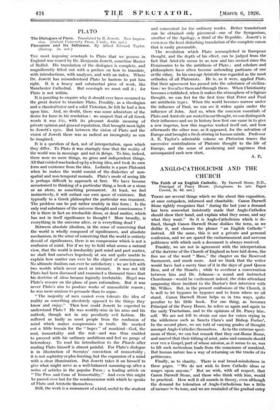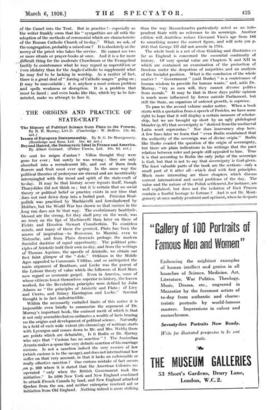ANGLO-CATHOLICISM AND THE CHURCH
THERE are several things which we like about this exposition, at once outspoken, informed and charitable. Canon Darwell Stone rightly recognizes that " during the last year a demand has been somewhat insistently made that Anglo-Catholics should show their hand, and explain what they mean, and say what they want." So it is .Anglo-Catholicism which is de- fined, though Canon Darwell Stone dislikes the term, as we dislike it, and chooses the phrase " an English Catholic " instead. All the same, this is not a private and personal confession, and we are spared the embarrassnient and nervous politeness with which such a document is always received.
Frankly, we are not in agreement with the interpretation of the doctrine of the Church of England as here laid down, the free use of the word " Mass," the chapter on the Reserved Sacrament, and much more. And we think that the writer would have had a merry time of it in the days of good Queen Bess, and of the Stuarts ; while to overhear a conversation between him and Dr. Johnsori:—a sound and instructed Churchman—would be excitement indeed, the risks' attendant surpassing those incident to the Doctor's first interview with Mr. Wilkes. But, in the present confusions of the Church, it is well to let bygones be bygones and to learn where we all stand. Canon Darwell Stone helps us in' two ways, quite peculiar to his little book. For one thing, as becomes Principal of the Pusey House, he refers us again and again to the early Tractarians, and to the opinions of Dr. Pusey him.. self. We are not left to strain our ears for voices crying in the wilderness such as Sancta Clara's and Bishop Forbes'. In the second place, we are told of varying grades of thought amongst Anglo-Catholics themselves. As to the extreme speci- mens of these, we can but remark that they out-Rome Rome, and marvel that their tithing of mint, anise and cummin should ever vex a Gospel, part of whose mission, as it seems to us, was to lift such meticulous loads from the conscience of mankind. But human nature has a way of returning on the tracks of its pettinesses.
Finally, as to charity. There is real broad-mindedness in these pages. ""We do not wish to force Catholic ideas or usages upon anyone." But eve wish, with all respect, that Canon Darwell Stone, and those who think with him, would be practical. How well it all sounds in theory, even although the demand for toleration of Anglo-Catholicism has a little of menace in its tone, and we are reminded of the gradual entry
of the. Camel into the Tent. But in practice !—especially as the writer frankly owns that his " sympathies are all with the adoption of the methods of ceremonial which are characteristic OE the Roman Catholic Church of to-day." What, we ask, of the congregation, probably a mixed one ? It is absohitely at the mercy of the priest who takes the.seryice. He cannot Use two 'difficult or more rituals or prayer-books at once. And it is a far more
!tacitly to, for the moderate Churchman or the Evangelical tacitly to, potintenance what he 'may regard as SuperEtition or even idolatry than for the Anglo-Catholic to supplement what :he. may feel to be laekiiig in worship. Ai a matter of fact, "there is a great deal of " forcing of Catholic usages " gang on ; it may be Unavoidable ;' it is .anyhow a most serious problem and spells weakness or disruption. It is a problein that must be faced and even books like this, which try to be fair- minded, make no attempt to face It.







































































 Previous page
Previous page